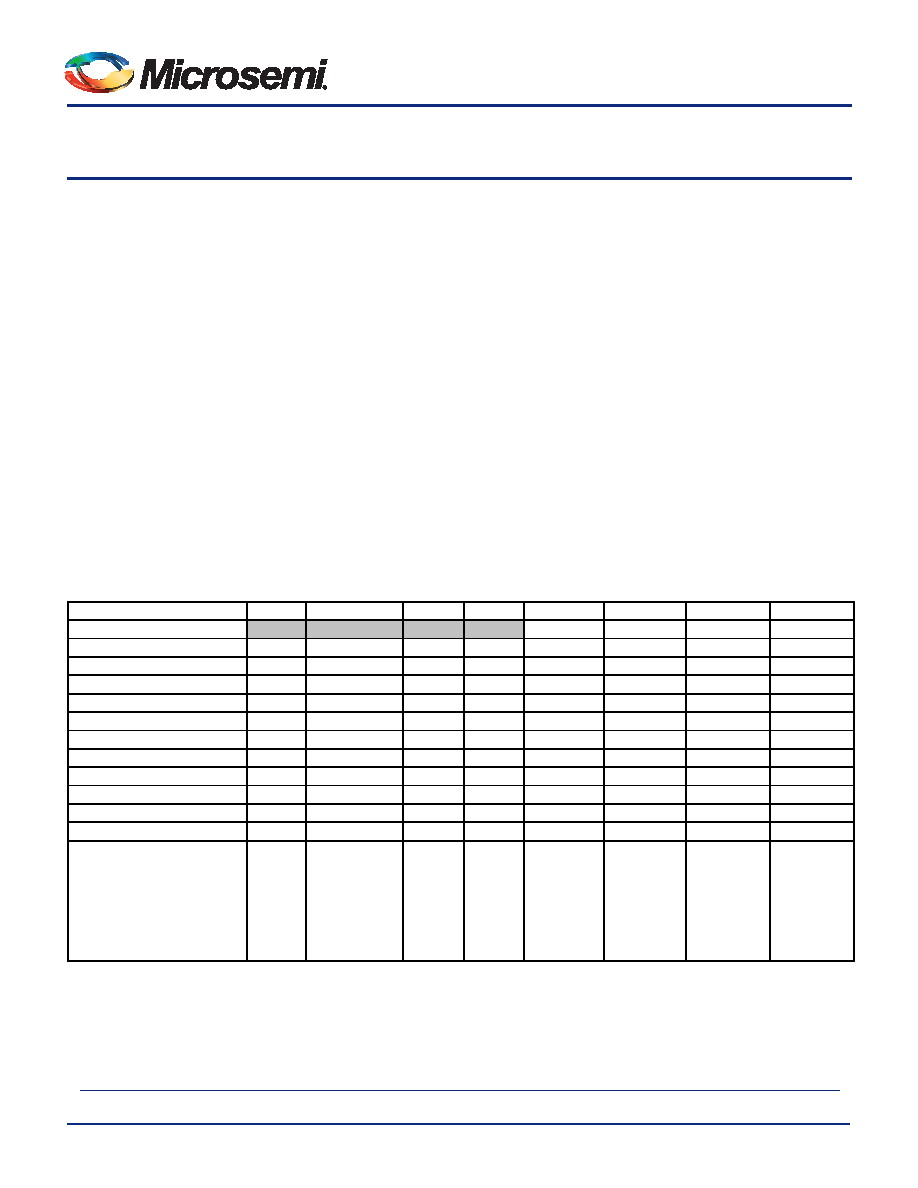- 您現(xiàn)在的位置:買賣IC網(wǎng) > PDF目錄4504 > A3P400-2PQ208 (Microsemi SoC)IC FPGA 1KB FLASH 400K 208-PQFP PDF資料下載
參數(shù)資料
| 型號(hào): | A3P400-2PQ208 |
| 廠商: | Microsemi SoC |
| 文件頁(yè)數(shù): | 1/220頁(yè) |
| 文件大?。?/td> | 0K |
| 描述: | IC FPGA 1KB FLASH 400K 208-PQFP |
| 標(biāo)準(zhǔn)包裝: | 24 |
| 系列: | ProASIC3 |
| RAM 位總計(jì): | 55296 |
| 輸入/輸出數(shù): | 151 |
| 門(mén)數(shù): | 400000 |
| 電源電壓: | 1.425 V ~ 1.575 V |
| 安裝類型: | 表面貼裝 |
| 工作溫度: | 0°C ~ 70°C |
| 封裝/外殼: | 208-BFQFP |
| 供應(yīng)商設(shè)備封裝: | 208-PQFP(28x28) |
當(dāng)前第1頁(yè)第2頁(yè)第3頁(yè)第4頁(yè)第5頁(yè)第6頁(yè)第7頁(yè)第8頁(yè)第9頁(yè)第10頁(yè)第11頁(yè)第12頁(yè)第13頁(yè)第14頁(yè)第15頁(yè)第16頁(yè)第17頁(yè)第18頁(yè)第19頁(yè)第20頁(yè)第21頁(yè)第22頁(yè)第23頁(yè)第24頁(yè)第25頁(yè)第26頁(yè)第27頁(yè)第28頁(yè)第29頁(yè)第30頁(yè)第31頁(yè)第32頁(yè)第33頁(yè)第34頁(yè)第35頁(yè)第36頁(yè)第37頁(yè)第38頁(yè)第39頁(yè)第40頁(yè)第41頁(yè)第42頁(yè)第43頁(yè)第44頁(yè)第45頁(yè)第46頁(yè)第47頁(yè)第48頁(yè)第49頁(yè)第50頁(yè)第51頁(yè)第52頁(yè)第53頁(yè)第54頁(yè)第55頁(yè)第56頁(yè)第57頁(yè)第58頁(yè)第59頁(yè)第60頁(yè)第61頁(yè)第62頁(yè)第63頁(yè)第64頁(yè)第65頁(yè)第66頁(yè)第67頁(yè)第68頁(yè)第69頁(yè)第70頁(yè)第71頁(yè)第72頁(yè)第73頁(yè)第74頁(yè)第75頁(yè)第76頁(yè)第77頁(yè)第78頁(yè)第79頁(yè)第80頁(yè)第81頁(yè)第82頁(yè)第83頁(yè)第84頁(yè)第85頁(yè)第86頁(yè)第87頁(yè)第88頁(yè)第89頁(yè)第90頁(yè)第91頁(yè)第92頁(yè)第93頁(yè)第94頁(yè)第95頁(yè)第96頁(yè)第97頁(yè)第98頁(yè)第99頁(yè)第100頁(yè)第101頁(yè)第102頁(yè)第103頁(yè)第104頁(yè)第105頁(yè)第106頁(yè)第107頁(yè)第108頁(yè)第109頁(yè)第110頁(yè)第111頁(yè)第112頁(yè)第113頁(yè)第114頁(yè)第115頁(yè)第116頁(yè)第117頁(yè)第118頁(yè)第119頁(yè)第120頁(yè)第121頁(yè)第122頁(yè)第123頁(yè)第124頁(yè)第125頁(yè)第126頁(yè)第127頁(yè)第128頁(yè)第129頁(yè)第130頁(yè)第131頁(yè)第132頁(yè)第133頁(yè)第134頁(yè)第135頁(yè)第136頁(yè)第137頁(yè)第138頁(yè)第139頁(yè)第140頁(yè)第141頁(yè)第142頁(yè)第143頁(yè)第144頁(yè)第145頁(yè)第146頁(yè)第147頁(yè)第148頁(yè)第149頁(yè)第150頁(yè)第151頁(yè)第152頁(yè)第153頁(yè)第154頁(yè)第155頁(yè)第156頁(yè)第157頁(yè)第158頁(yè)第159頁(yè)第160頁(yè)第161頁(yè)第162頁(yè)第163頁(yè)第164頁(yè)第165頁(yè)第166頁(yè)第167頁(yè)第168頁(yè)第169頁(yè)第170頁(yè)第171頁(yè)第172頁(yè)第173頁(yè)第174頁(yè)第175頁(yè)第176頁(yè)第177頁(yè)第178頁(yè)第179頁(yè)第180頁(yè)第181頁(yè)第182頁(yè)第183頁(yè)第184頁(yè)第185頁(yè)第186頁(yè)第187頁(yè)第188頁(yè)第189頁(yè)第190頁(yè)第191頁(yè)第192頁(yè)第193頁(yè)第194頁(yè)第195頁(yè)第196頁(yè)第197頁(yè)第198頁(yè)第199頁(yè)第200頁(yè)第201頁(yè)第202頁(yè)第203頁(yè)第204頁(yè)第205頁(yè)第206頁(yè)第207頁(yè)第208頁(yè)第209頁(yè)第210頁(yè)第211頁(yè)第212頁(yè)第213頁(yè)第214頁(yè)第215頁(yè)第216頁(yè)第217頁(yè)第218頁(yè)第219頁(yè)第220頁(yè)

January 2013
I
2013 Microsemi Corporation
ProASIC3 Flash Family FPGAs
with Optional Soft ARM Support
Features and Benefits
High Capacity
15 k to 1 M System Gates
Up to 144 kbits of True Dual-Port SRAM
Up to 300 User I/Os
Reprogrammable Flash Technology
130-nm, 7-Layer Metal (6 Copper), Flash-Based CMOS
Process
Instant On Level 0 Support
Single-Chip Solution
Retains Programmed Design when Powered Off
High Performance
350 MHz System Performance
3.3 V, 66 MHz 64-Bit PCI
In-System Programming (ISP) and Security
ISP Using On-Chip 128-Bit Advanced Encryption Standard
(AES) Decryption (except ARM-enabled ProASIC3 devices)
via JTAG (IEEE 1532–compliant)
FlashLock to Secure FPGA Contents
Low Power
Core Voltage for Low Power
Support for 1.5 V-Only Systems
Low-Impedance Flash Switches
High-Performance Routing Hierarchy
Segmented, Hierarchical Routing and Clock Structure
Advanced I/O
700 Mbps DDR, LVDS-Capable I/Os (A3P250 and above)
1.5 V, 1.8 V, 2.5 V, and 3.3 V Mixed-Voltage Operation
Wide Range Power Supply Voltage Support per JESD8-B,
Allowing I/Os to Operate from 2.7 V to 3.6 V
Bank-Selectable I/O Voltages—up to 4 Banks per Chip
Single-Ended
I/O
Standards:
LVTTL,
LVCMOS
3.3 V /
2.5 V / 1.8 V / 1.5 V, 3.3 V PCI / 3.3 V PCI-X and LVCMOS
2.5 V / 5.0 V Input
Differential I/O Standards: LVPECL, LVDS, B-LVDS, and
M-LVDS (A3P250 and above)
I/O Registers on Input, Output, and Enable Paths
Hot-Swappable and Cold Sparing I/Os
Weak Pull-Up/-Down
IEEE 1149.1 (JTAG) Boundary Scan Test
Pin-Compatible Packages across the ProASIC3 Family
Clock Conditioning Circuit (CCC) and PLL
Six CCC Blocks, One with an Integrated PLL
Configurable Phase-Shift, Multiply/Divide, Delay Capabilities
and External Feedback
Wide Input Frequency Range (1.5 MHz to 350 MHz)
1 kbit of FlashROM User Nonvolatile Memory
SRAMs and FIFOs with Variable-Aspect-Ratio 4,608-Bit RAM
True Dual-Port SRAM (except ×18)
ARM Processor Support in ProASIC3 FPGAs
M1 ProASIC3 Devices—ARMCortex-M1 Soft Processor
Available with or without Debug
A3P015 and A3P030 devices do not support this feature.
Supported only by A3P015 and A3P030 devices.
ProASIC3 Devices
A3P0151
A3P030
A3P060
A3P125
A3P250
A3P400
A3P600
A3P1000
Cortex-M1 Devices 2
M1A3P250
M1A3P400
M1A3P600
M1A3P1000
System Gates
15,000
30,000
60,000
125,000
250,000
400,000
600,000
1,000,000
Typical Equivalent Macrocells
128
256
512
1,024
2,048
–
VersaTiles (D-flip-flops)
384
768
1,536
3,072
6,144
9,216
13,824
24,576
RAM Kbits (1,024 bits)
–
18
36
54
108
144
4,608-Bit Blocks
––
4
8
12
24
32
FlashROM Kbits
11
1
Secure (AES) ISP 3
–
Yes
Integrated PLL in CCCs
––
1
VersaNet Globals 4
6
18
I/O Banks
22
2
4
Maximum User I/Os
49
81
96
133
157
194
235
300
Package Pins
QFN
CS
VQFP
TQFP
PQFP
FBGA
QN68
QN48, QN68,
QN132
VQ100
QN132
CS121
VQ100
TQ144
FG144
QN132
VQ100
TQ144
PQ208
FG144
QN132 5
VQ100
PQ208
FG144/256 5
PQ208
FG144/256/
484
PQ208
FG144/256/
484
PQ208
FG144/256/
484
Notes:
1. A3P015 is not recommended for new designs.
2. Refer to the Cortex-M1 product brief for more information.
3. AES is not available for Cortex-M1 ProASIC3 devices.
4. Six chip (main) and three quadrant global networks are available for A3P060 and above.
5. The M1A3P250 device does not support this package.
6. For higher densities and support of additional features, refer to the ProASIC3E Flash Family FPGAs datasheet.
Revision 13
相關(guān)PDF資料 |
PDF描述 |
|---|---|
| AMC28DRXS | CONN EDGECARD 56POS .100 DIP SLD |
| A3P250L-FG144I | IC FPGA 1KB FLASH 250K 144-FBGA |
| ACM43DTKN-S288 | CONN EDGECARD EXTEND 86POS 0.156 |
| ACM43DTKH-S288 | CONN EDGECARD EXTEND 86POS 0.156 |
| M1A3P600-PQG208 | IC FPGA 1KB FLASH 600K 208-PQFP |
相關(guān)代理商/技術(shù)參數(shù) |
參數(shù)描述 |
|---|---|
| A3P400-2PQ208I | 功能描述:IC FPGA 1KB FLASH 400K 208-PQFP RoHS:否 類別:集成電路 (IC) >> 嵌入式 - FPGA(現(xiàn)場(chǎng)可編程門(mén)陣列) 系列:ProASIC3 標(biāo)準(zhǔn)包裝:90 系列:ProASIC3 LAB/CLB數(shù):- 邏輯元件/單元數(shù):- RAM 位總計(jì):36864 輸入/輸出數(shù):157 門(mén)數(shù):250000 電源電壓:1.425 V ~ 1.575 V 安裝類型:表面貼裝 工作溫度:-40°C ~ 125°C 封裝/外殼:256-LBGA 供應(yīng)商設(shè)備封裝:256-FPBGA(17x17) |
| A3P400-2PQG144 | 制造商:ACTEL 制造商全稱:Actel Corporation 功能描述:ProASIC3 Flash Family FPGAs |
| A3P400-2PQG144ES | 制造商:ACTEL 制造商全稱:Actel Corporation 功能描述:ProASIC3 Flash Family FPGAs |
| A3P400-2PQG144I | 制造商:ACTEL 制造商全稱:Actel Corporation 功能描述:ProASIC3 Flash Family FPGAs |
| A3P400-2PQG144PP | 制造商:ACTEL 制造商全稱:Actel Corporation 功能描述:ProASIC3 Flash Family FPGAs |
發(fā)布緊急采購(gòu),3分鐘左右您將得到回復(fù)。